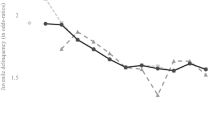Abstract
A recurrent pattern of provocative, antisocial, delinquent behaviors has been found by the senior author and others to be characteristic of clinically referred adopted children and adolescents. Although the parents often defensively insist that adoption is not relevant to the child's problems, the child himself frequently reveals obsessive fantasies about his birth parents. The underlying psychodynamics include the child's inability to integrate two sets of parental images—often one “bad” and the other “good”—into a single realistic image, and resultant impairment in the development of the superego. A negative self-image is often mirrored by the adoptive parents' projection of their own unacceptable impulses onto the child and the birth parents. The paper concludes with a discussion of implications for post-adoption counseling, clinical treatment, open records, and screening of potential adoptive parents.
Similar content being viewed by others
References
Brinich, P. M. (1980). Some potential effects of adoption on self and object representations.Psychoanalytic Study of the Child 35, 107–133.
Chapman, C., Dorner, P., Silber, K., & Winterberg, T. S. (1987a). Meeting the needs of the adoption triangle through open adoption: The adoptive parent.Child and Adolescent Social Work 4 (Spring), 3–12.
Chapman, C., Dorner, P., Silber, K., & Winterberg, T. S. (1987b). Meeting the needs of the adoption triangle through open adoption: The adoptee.Child and Adolescent Social Work 4 (Summer), 78–91.
Clothier, F. (1943). The psychology of the adopted child.Mental Hygiene 27, 222–230.
Derdeyn, A. P. (1979). Adoption and the ownership of children.Child Psychiatry and Human Development 9 (Summer), 215–226.
Easson, W. M. (1973). Special sexual problems of the adopted adolescent.Medical Aspects of Human Sexuality 17, 92–105.
Glatzer, H. T. (1955). Adoption and delinquency.Nervous Child 11, 52–56.
Graham, P., & Stevenson, J. (1985). A twin study of genetic influences on behavioral deviance.Journal of the American Academy of Child Psychiatry 24 (Jan.), 33–41.
Herrnstein, R. J., & Wilson, J. Q. (1985).Crime and Human Nature. New York: Simon and Schuster.
Johnson, A. M., & Szurek, S. A. (1952). The genesis of antisocial acting out behavior in children and adults.Psychoanalytic Quarterly 21, 323–343.
Kirk, H. D. (1964).Shared Fate: A Theory of Adoption and Mental Health. New York: Macmillan.
Kirschner, D. (1980). “The Adopted Child Syndrome: A study of some characteristics of disturbed adopted children.” Report of the South Shore Institute for Advanced Studies, Merrick, N. Y.
Lifton, B. J. (1988).Lost and Found, 2d edition. New York: Harper & Row.
Mednick, S. A., Gabrielli, W.F., & Hutchings, B. Genetic influences in criminal convictions: Evidence from an adoption cohort.Science 224, 891–894.
Menlove, F. L. (1965). Aggressive symptoms in emotionally disturbed adopted children.Child Development 36, 519–532.
Nickman, S. (1985). Losses in adoption: The need for dialogue.Psychoanalytic Study of the Child 40, 365–398.
Offord, D. R., Aponte, J. F., & Cross, L. A. (1969). Presenting symptomatology of adopted children.Archives of General Psychiatry 20 (Jan.), 110–116.
Sabalis, R. F. & Burch, E. A., Jr. (1980) Comparisons of psychiatric problems of adopted and nonadopted patients.Southern Medical Journal 73, 867–869.
Schechter, M. D., Carlson, P. V., Simmons, J. Q., III, & Work Henry H. (1964). Emotional problems in the adoptee.Archives of General Psychiatry 10, (Feb.), 109–118.
Simon, N. M. & Senturia, A. G. (1966). Adoption and psychiatric illness.American Journal of Psychiatry 122 (8), 858–868.
Toussieng, P. W. (1962). Thoughts regarding the etiology of psychological difficulties in adopted children.Child Welfare 41 (February), 59–71.
Weiss, A. (1985). Symptomatology of adopted and nonadopted adolescents in a psychiatric hospital.Adolescence 20 (Winter), 763–774.
Author information
Authors and Affiliations
Rights and permissions
About this article
Cite this article
Kirschner, D., Nagel, L.S. Antisocial behavior in adoptees: Patterns and dynamics. Child Adolesc Soc Work J 5, 300–314 (1988). https://doi.org/10.1007/BF00755393
Issue Date:
DOI: https://doi.org/10.1007/BF00755393




